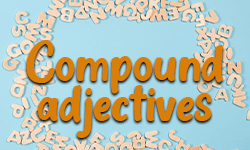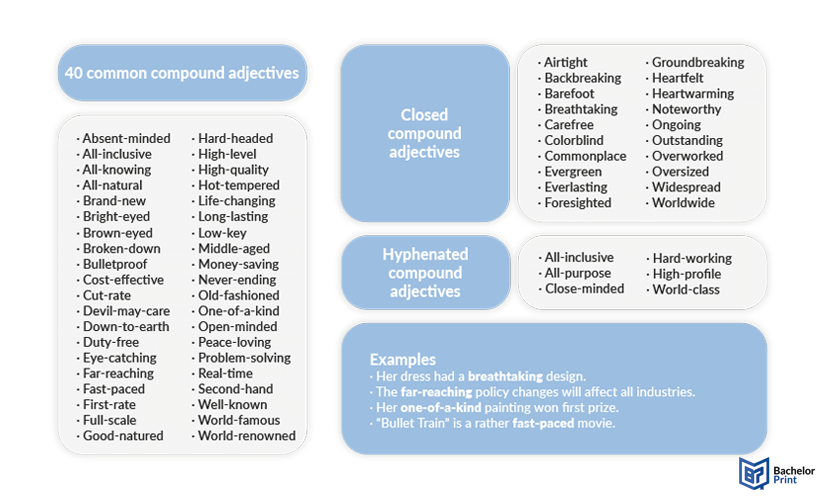
Compound adjectives are a fascinating aspect of language rules as they combine two or more words to create a single, descriptive term. These special types of compound words make sentences more engaging and expressive, so learning how to form and use them correctly with the help of this article is key to fostering effective communication and avoiding common grammar pitfalls.
Definition: Compound adjectives
A compound adjective, also known as a compound modifier, is a single, descriptive unit formed by combining two or more constituents that function together as one unit to modify a noun. Unlike s, compound modifiers function as adjectives as the name suggests. These words are often linked by a hyphen and work as a cohesive adjective that carries a specific meaning that the individual words might not fully communicate on their own.
Types
Compound modifiers can be categorized based on their structure, including the use of hyphens and spacing. Here are the main types of adjectives.
Closed compound adjectives are written as a single word, without spaces or hyphens.
The majority of compound adjectives are typically linked with a hyphen to clarify their meaning and guarantee pleasant reading.
Open compound modifiers use separate words without a hyphen but are treated as a single descriptive unit. They are less common as most are hyphenated.
Open proper nouns (names or titles starting with capital letters) can be transformed into compound adjectives by adding an en dash (–) to bridge the space between the words, as the prefix applies to the entire proper noun.
Note: According to the Chicago Manual of Style, the en dash should only be used for two purposes: to indicate ranges of time, money, or when it replaces “to” or “through.” It should also be used in a compound modifier when one of the constituents of the adjective is an open compound, or when two or more of its constituents are compounds.
Formations
Compound modifiers can consist of various combinations, such as an adjective and a noun (full-time), an adverb and a past participle (quickly forgotten), or a number and a unit of measurement (five-year plan).
| Compound constituents | Examples |
| adjective + noun | long-distance, high-quality, short-term |
| adjective + present participle | easy-going, long-lasting, quick-thinking |
| adjective + past participle | hard-boiled, old-fashioned, short-lived |
| number + noun | five-year, three-hour, twelve-page |
| noun + adjective | accident-prone, fat-free, ice-cold |
| noun + noun | bulletproof, part-time, north-west |
| noun + present participle | English-speaking, mind-blowing, record-breaking |
| noun + past participle | handmade, middle-aged, sun-dried |
| adverb + past participle | well-known, well-paid, well-respected |
Note: Not all compound adjectives need a hyphen; however, to avoid ambiguity, its usage is preferred. For instance, if we have the sentence “a deep blue sea,” it would mean that the sea is both deep and blue. If the color of the sea is deep-blue, we would need a hyphen to avoid confusion, making it “a deep-blue sea.” Also, not all adverbs ending in “-ly” need a hyphen and not all words ending in “-ly” are adverbs (family-oriented).
Examples
Numerous English example sentences can be found below.
The image below illustrates various common compound adjectives, along with example sentences.

Common mistakes
Many mistakes can arise when working with compound modifiers. Below, you will find the most commonly encountered mistakes.
Hyphenation after nouns
You don’t need to hyphenate a compound modifier when it appears after the noun it modifies.
Hyphen with adverbs
Most modern writing guides advise against the use of hyphens when the adverb ends with “-ly” since ambiguity is virtually impossible.
Superlative forms in compounds
When a compound modifier comes before the word it modifies, a hyphen is needed. This is also the case with compound adjectives containing a superlative, such as “best,” “least,” or “worst.” If it functions as an adjective, use a hyphen.
Wrong dash usage
There are the different dashes in the English language: the en dash (–) is slightly wider than the hyphen (-) but narrower than the em dash (—). When it comes to compound adjectives, a hyphen can be mistakenly used instead of an en dash. This is the case when combining an open or hyphenated compound with another word to form a compound modifier. However, as time goes by, many writers ignore the existence of en and em dashes and only use them for aesthetic choices.
Note: To create an en dash, press “ctrl” and the “minus” key on your numeric keypad.
FAQs
Compound adjectives are two or more words that are combined to function as a single unit to modify a noun. They are often hyphenated when placed before a noun.
Common examples are:
- Well-known
- Long-term
- High-quality
- Part-time
- Family-friendly
- Heart-breaking
- Full-time
- User-friendly
- Short-tempered
- Cold-hearted
Hyphenate compound adjectives when they appear before a noun to clarify they act as one modifier (a well-known artist). Drop the hyphen when they come after the noun (the artist is well known). Do not hyphenate if the first word is an “-ly” adverb (highly skilled worker).